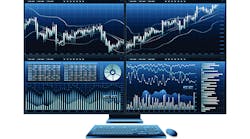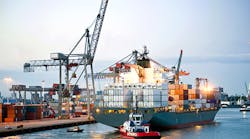It’s an article of faith among almost everyone who ventures to discuss economics that exporting domestically made products is a great advantage to our industrial sector, and to the U.S. economy in general. It’s such a broad and simple proposition that it’s hard to dispute – though, of course, there are examples of poor countries with export-based economies that do not seem to benefit by such an arrangement. My concern, however, is not who exports well or poorly, or more or less, but how the high principle of export-based prosperity excuses other, less admirable policies.
I’m not arguing that manufacturers should not seek to export more, only that exporting goods is not obviously more profitable than selling those goods to domestic buyers. It seems to me the confusion on this point is based on two impressions we carry about our economic history, one that is misunderstood and another that is remembered too well.
The first is the common belief that the U.S. manufacturers dominated the world economy in the late 1940s and ‘50s – a nostalgic notion but not an accurate one. It’s true that in U.S. manufacturers were dominant exporters in most industrial sectors, but that was mostly because European and Asian manufacturing sectors had been destroyed by war, or had yet to be established. Even during that export-heyday, domestic demand remained significantly more important to U.S. manufacturers than overseas opportunities. Nevertheless, the notion of an export-driven U.S. economy offers encouragement that the glorious post-war era can be restored.
The second factor involves the difficulties U.S. manufacturers endured during the 1970s and ‘80s, attributable to rising labor costs, energy price spikes, and inflation-sapping consumer demand. This is also the period when imported manufactured goods, produced in low-cost markets, frequently with the aid of government subsidies, and often below the quality standards maintained by domestic producers, began to undermine the competitiveness of domestic manufacturing. It’s a difficult memory, and the prospect of a resurgent export base gives assurance that it won’t reoccur, and a satisfying bit of retribution too.
I’ve been mulling all these impressions for some time but it’s lately been crystallized by the debate over whether or not the federal government should reauthorize its Export-Import Bank. The ExIm Bank is a federal credit agency that finances sales of U.S. exports to international buyers: if a U.S. company has a customer offshore that cannot afford the price of the products they aim to import, the ExIm Bank may finance the purchase. This is said to be good for all sides, because the foreign market is improved by economic activity, the U.S. exporter gains the purchase order, and the federal agency collects the interest on the loan it extends.
In practice, say critics, it’s obvious that the ExIm Bank is another federal misstep into commercial activity, an unnecessary and unwelcome deviation from the basic purposes of U.S. democracy. They argue that manufacturing giants like Boeing and General Electric are the major beneficiaries of ExIm loans – though such companies are rich enough to finance their own transactions without sponging off the taxpayers. Even more, they explain that financing the commercial activity of foreign companies is unfair to domestic competitors: Delta Airlines claims it does not get the same financing assistance that Air India has on its purchase of new Boeing jets.
In fact the current debate over reauthorizing the ExIm Bank is not a discussion about the benefits of commercial activity, but about who has influence to get federal assistance for their own projects — and who benefits by the exchange of that influence. And all that influence trading is obscured by the simplistic belief that if we are exporting, we must be doing something right.
The ExIm Bank is an artifact of the past we don’t recall clearly, but it’s a convenient resource to savvy players in the global economy. They don’t really need our help, but they’ll take if it makes us feel better.









